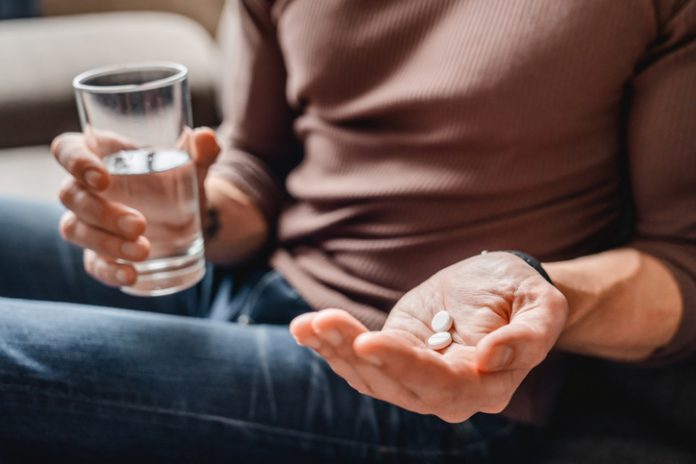Two new scientific studies are raising questions about the use of antidepressants in treating clinical depression.
A study published on August 2 in BMJ, a journal for health care professionals, found about 15 percent of people receive a large benefit from antidepressants, whereas the pills are no better than a placebo for 85 percent of those who take them.
A July study in Molecular Psychiatry found low serotonin levels do not cause depression. Researchers at University College London (UCL) found no link between serotonin levels and depression, through a “systematic umbrella review” of evidence about the association. The scientists reached their conclusions through an analysis of 17 studies on the topic.
The study calls into question the prescription drug Prozac and other selective serotonin reuptake inhibitors (SSRIs) that have been sold for decades. SSRIs are designed to boost levels of serotonin by inhibiting reuptake by nerve cells. The UCL study found no evidence of any link between the mechanism and depression outcomes.
“Our study shows that [the serotonin theory of depression] is not supported by scientific evidence. It also calls into question the basis for the use of antidepressants,” the authors write in an article describing their conclusions.
Theory vs. Practice
Critics of the study say scientists have long known the serotonin theory, popularly referred to as a “chemical imbalance,” was simplistic and drugs can still work even if we don’t know how they do so.
“I have never once in my career when I prescribed an antidepressant, told my patient that the drug corrects a serotonin deficiency,” said Robert Emmons, M.D., a psychiatrist and clinical ethics advocate who is a policy advisor to The Heartland Institute, which publishes Health Care News.
“I don’t say much to my patients about the mechanism of action of any drug, because not enough is known to tell that story in a responsible way,” Emmons said. “The brain is incredibly complex, so any story about a mechanism of action for any given drug is, by necessity, overly simplistic.”
Drugs vs. Therapy
Emmons says monetary incentives can lead doctors to treat depression with drugs instead of therapy.
“The American Psychiatric Association (APA) receives a lot of funding from the pharmaceutical industry, which creates an incentive for APA educational programs to emphasize pharmacotherapy over psychotherapy,” said Emmons. “Third-party payers tend to pay psychiatrists higher fees for brief, medication-focused visits, compared to the fees for psychotherapy sessions. Psychiatrists, like anyone else, tend to follow the money.”
The studies are getting particular attention because the use of antidepressants soared during the COVID-19 pandemic About 13 percent of American adults were taking a prescribed antidepressant before the pandemic, and the number of prescriptions increased by 6 percent during the pandemic. A Boston University study found reported depression rates tripled during the first year of the pandemic. The global antidepressant market reached $26.25 billion in 2020.
Universal vs. Particular
Even when drugs are shown to be useful, the findings may be less applicable than most people realize, says Emmons.
“Randomized, placebo-controlled clinical trials can demonstrate the efficacy of drugs in highly selected, relatively small pools of subjects,” said Emmons. “There exist very strong financial incentives for investigators to puff up relatively weak findings of efficacy.
“Demonstrating the efficacy of a drug in a clinical trial says relatively little about its precise neurochemical mechanism of action,” said Emmons.
Trusting Scientific Process
Doctors and scientists need more information about the drugs’ effectiveness, says Jeff Singer, M.D., a surgeon and a senior fellow at the Cato Institute who has spoken out about the challenges of proving a drug’s efficacy.
“I don’t prescribe antidepressants,” said Singer. “However, many psychiatrists and internists I know tell me they definitely work. The BMJ study is just one study. I would not jump to any conclusion based upon one study. And I am not sure how good the study’s methodology is.
“It is not unusual for medical science to have accepted one explanation for why a specific drug works, only to learn, upon further research, that the explanation was incorrect and there is a different explanation, as is the case in the Molecular Psychiatry article,” said Singer. “That’s how science works.”
Clinical trials are the gold standard in answering these questions, says Singer.
“Clinical trials are the best we have to work with when it comes to medical science,” said Singer. “What works in a test tube may not work in a living human. Clinical trials provide empirical data as to whether a drug works and how safe and effective it is.”
‘Enforcing Social Hierarchy’
Just as drugs don’t work the same way on all individuals, the term “depression” might mean different things for different people.
“‘Depression’ is a popular name that encompasses a complex, heterogeneous set of disorders that involve interactions between individual minds, individual lifestyles, genetics, environmental toxins, and social systems,” said Emmons. “The upside of all this complexity is that there are a lot of different avenues open for effective intervention.”
Sometimes health professionals feel pressured to follow consensus views, says Emmons.
“Individuals who do not comply with the demands of social hierarchy often get ignored or punished,” said Emmons. “As we have seen with COVID over the past two years, most public discourse about any medical topic is more about enforcing social hierarchy than it is about rigorous application of the scientific method.
“Enforcing consensus, formally or informally, is not at all part of the scientific method. Enforcing consensus is expressly anti-scientific,” said Emmons.
Harry Painter (harry@harrypainter.com) writes from Oklahoma.





















